انحسار وجفاف الفرات يحصل بتسارع منذ سنتين هل اقتربت الملحمة الكبرى؟ صور
صور من جفاف اجزاء من نهر الفرات
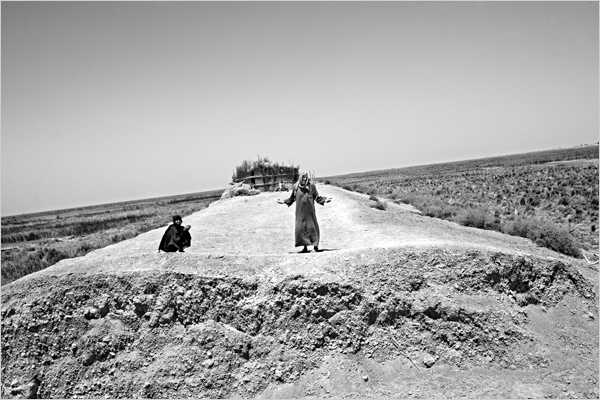
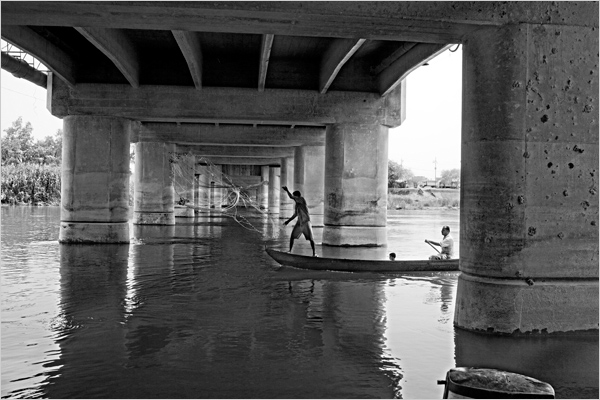
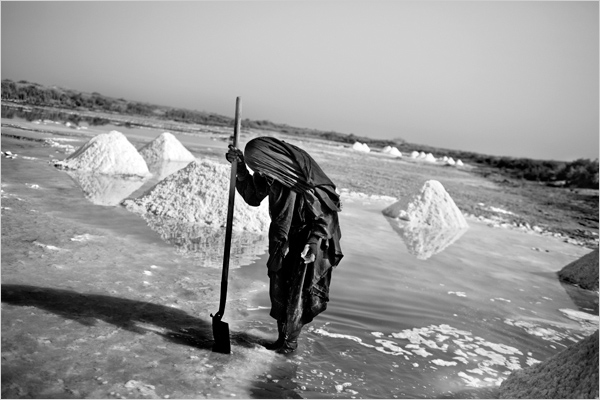
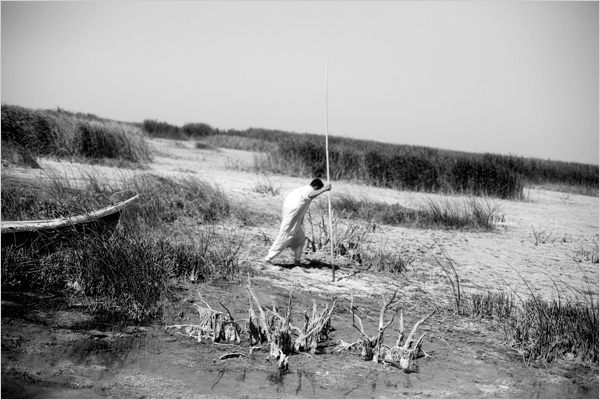

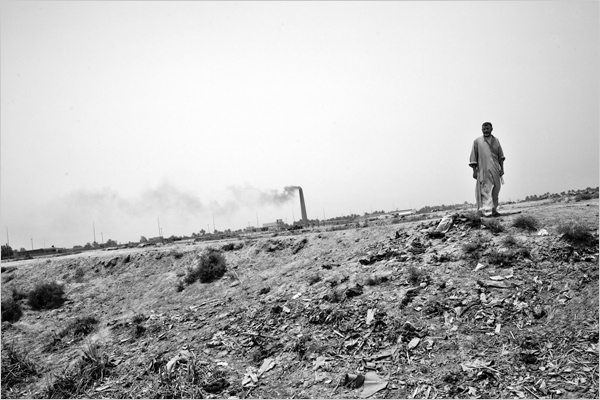
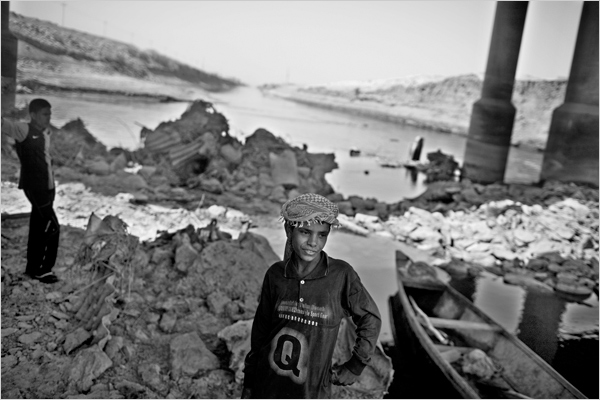
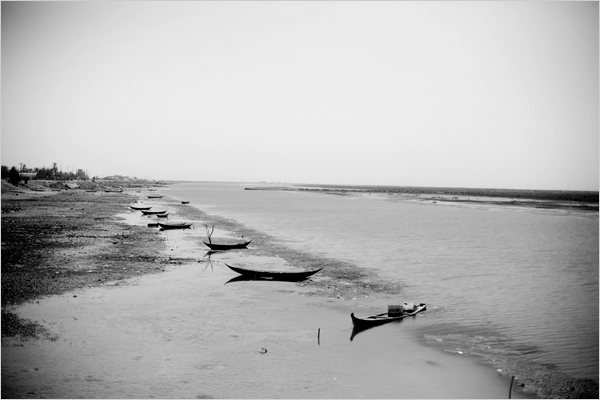
لمن اراد مشاهدة الصور كاملة مع تعليق New York Times عليها:
New York Times التقرير انجليزي
Iraq Suffers as the Euphrates River Dwindles
A boy rested on the mud in a dried-up section of the Euphrates River near Jubaish, Iraq, in June.
JUBAISH, Iraq — Throughout the marshes, the reed gatherers, standing on land they once floated over, cry out to visitors in a passing boat.
Skip to next paragraph
Bashia Mohammed, 60, gathered salt in a drainage pool on the outskirts of Diwaniya. It is her family’s only source of income now that its rice farm has dried up.
Rice farmers surveyed their dry field near a village on the outskirts of Najaf. Iraq is now importing more and more grain.
“Maaku mai!” they shout, holding up their rusty sickles. “There is no water!”
The Euphrates is drying up. Strangled by the water policies of Iraq’s neighbors, Turkey and Syria; a two-year drought; and years of misuse by Iraq and its farmers, the river is significantly smaller than it was just a few years ago. Some officials worry that it could soon be half of what it is now.
The shrinking of the Euphrates, a river so crucial to the birth of civilization that the Book of Revelation prophesied its drying up as a sign of the end times, has decimated farms along its banks, has left fishermen impoverished and has depleted riverside towns as farmers flee to the cities looking for work.
The poor suffer more acutely, but all strata of society are feeling the effects: sheiks, diplomats and even members of Parliament who retreat to their farms after weeks in Baghdad.
Along the river, rice and wheat fields have turned to baked dirt. Canals have dwindled to shallow streams, and fishing boats sit on dry land. Pumps meant to feed water treatment plants dangle pointlessly over brown puddles.
“The old men say it’s the worst they remember,” said Sayid Diyia, 34, a fisherman in Hindiya, sitting in a riverside cafe full of his idle colleagues. “I’m depending on God’s blessings.”
The drought is widespread in Iraq. The area sown with wheat and barley in the rain-fed north is down roughly 95 percent from the usual, and the date palm and citrus orchards of the east are parched. For two years rainfall has been far below normal, leaving the reservoirs dry, and American officials predict that wheat and barley output will be a little over half of what it was two years ago.
It is a crisis that threatens the roots of Iraq’s identity, not only as the land between two rivers but as a nation that was once the largest exporter of dates in the world, that once supplied German beer with barley and that takes patriotic pride in its expensive Anbar rice.
Now Iraq is importing more and more grain. Farmers along the Euphrates say, with anger and despair, that they may have to abandon Anbar rice for cheaper varieties.
Droughts are not rare in Iraq, though officials say they have been more frequent in recent years. But drought is only part of what is choking the Euphrates and its larger, healthier twin, the Tigris.
The most frequently cited culprits are the Turkish and Syrian governments. Iraq has plenty of water, but it is a downstream country. There are at least seven dams on the Euphrates in Turkey and Syria, according to Iraqi water officials, and with no treaties or agreements, the Iraqi government is reduced to begging its neighbors for water.
At a conference in Baghdad — where participants drank bottled water from Saudi Arabia, a country with a fraction of Iraq’s fresh water — officials spoke of disaster.
“We have a real thirst in Iraq,” said Ali Baban, the minister of planning. “Our agriculture is going to die, our cities are going to wilt, and no state can keep quiet in such a situation.”
Recently, the Water Ministry announced that Turkey had doubled the water flow into the Euphrates, salvaging the planting phase of the rice season in some areas.
That move increased water flow to about 60 percent of its average, just enough to cover half of the irrigation requirements for the summer rice season. Though Turkey has agreed to keep this up and even increase it, there is no commitment binding the country to do so.
With the Euphrates showing few signs of increasing health, bitterness over Iraq’s water threatens to be a source of tension for months or even years to come between Iraq and its neighbors. Many American, Turkish and even Iraqi officials, disregarding the accusations as election-year posturing, say the real problem lies in Iraq’s own deplorable water management policies.
“There used to be water everywhere,” said Abduredha Joda, 40, sitting in his reed hut on a dry, rocky plot of land outside Karbala. Mr. Joda, who describes his dire circumstances with a tired smile, grew up near Basra but fled to Baghdad when Saddam Hussein drained the great marshes of southern Iraq in retaliation for the 1991 Shiite uprising. He came to Karbala in 2004 to fish and raise water buffaloes in the lush wetlands there that remind him of his home.
“This year it’s just a desert,” he said.
Along the river, there is no shortage of resentment at the Turks and Syrians. But there is also resentment at the Americans, Kurds, Iranians and the Iraqi government, all of whom are blamed. Scarcity makes foes of everyone.
The Sunni areas upriver seem to have enough water, Mr. Joda observed, a comment heavy with implication.
Officials say nothing will improve if Iraq does not seriously address its own water policies and its history of flawed water management. Leaky canals and wasteful irrigation practices squander the water, and poor drainage leaves fields so salty from evaporated water that women and children dredge huge white mounds from sitting pools of runoff.
On a scorching morning in Diwaniya, Bashia Mohammed, 60, was working in a drainage pool by the highway gathering salt, her family’s only source of income now that its rice farm has dried up. But the dead farm was not the real crisis.
“There’s no water in the river that we drink from,” she said, referring to a channel that flows from the Euphrates. “It’s now totally dry, and it contains sewage water. They dig wells but sometimes the water just cuts out and we have to drink from the river. All my kids are sick because of the water.”
In the southeast, where the Euphrates nears the end of its 1,730-mile journey and mingles with the less salty waters of the Tigris before emptying into the Persian Gulf, the situation is grave. The marshes there that were intentionally reflooded in 2003, rescuing the ancient culture of the marsh Arabs, are drying up again. Sheep graze on land in the middle of the river.
The farmers, reed gatherers and buffalo herders keep working, but they say they cannot continue if the water stays like this.
“Next winter will be the final chance,” said Hashem Hilead Shehi, a 73-year-old farmer who lives in a bone-dry village west of the marshes. “If we are not able to plant, then all of the families will leave.”
نيو يورك تايمز تقتبس من انجيل رؤيا يوحنا عن جفاف الفرات وهذه الترجمة العربية للسطر المقصود
12 وَسَكَبَ الْمَلاَكُ السَّادِسُ كَأْسَهُ عَلَى نَهْرِ «الْفُرَاتِ» الْكَبِيرِ فَجَفَّ مَاؤُهُ، لِيَصِيرَ مَمَرّاً لِلْمُلُوكِ الْقَادِمِينَ مِنَ الشَّرْقِ.
ما المقصود بـ "للملوك القادمين من الشرق"؟!
اما ما لدينا من احاديث الرسول صلى الله عليه وسلم فهي كثيرة واوجزها بما لدي:
قال رسول الله صلى الله عليه وسلم ( يوشك الفرات ان ينحسر عن كنز من ذهب فمن حضرة فلا يأخذ منه شياً ) رواه البخاري ( 7119 ) وفي رواية مسلم ( يحسر الفرات عن جبل من ذهب فيقتتل عليه الناس فيقتل من كل مائة تسع وتسعون ) .
عن أبي هريرة رضي الله عنه قال : قال رسول الله صلى الله عليه وسلم : ** لا تقوم الساعة حتى يُحْسَر الفرات عن جبل من ذهب يقتتل الناس عليه ، فيقتل من كل مائة تسعة وتسعون ، فيقول كل رجل منهم : لعلي أكون أنا أنجو } رواه الشيخين. و في رواية قال : قال رسول الله صلى الله عليه وسلم : ** يوشك الفرات أن يحسر عن كنز من ذهب فمن حضره فلا يأخذ منه شيئاً} . رواه الشيخين ورواه أيضاً أبو داود والترمذي . و عن أبيّ بن كعب قال :** لا يزال الناس مختلفة أعناقهم في طلب الدنيا ؟ قلت : أجل ، قال : فإني سمعت رسول الله صلى الله عليه وسلم يقول : يوشك الفرات أن ينحسر عن جبل من ذهب ، فإذا سمع به الناس ساروا إليه ، فيقول من عنده : لئن تركنا الناس يأخذون منه ليذهبن به كله ، قال : فيقتتلون عليه ، فيقتل من كل مائة تسعة و تسعون }رواه مسلم . و عن أبي هريرة رضي الله عنه قال : قال رسول الله صلى الله عليه وسلم : ** لا تذهب الدنيا حتى ينجلي فراتكم عن جزيرة من ذهب ، فيقتتلون عليه ، فيقتل من كل مائة تسعة و تسعون }. رواه حنبل بن إسحاق في كتابه الفتن بسند صحيح . عن أبي هريرة قال: لا تقوم الساعة حتى يحسر الفرات عن جبل من ذهب يقتتل عليه الناس، فيقتل تسعة أعشارهم. عن أبي هريرة قال: قال رسول الله صلى الله عليه وسلم لا تقوم الساعة حتى يحسر الفرات عن جبل من ذهب فيقتتل الناس عليه فيقتل من كل عشرة تسعة (سنن ابن ماجه). عن أبي هريرة قال: قال رسول الله صلى الله عليه وسلم يحسر الفرات عن جبل من ذهب فيقتتل الناس فيقتل من كل مائة تسعون أو قال تسعة وتسعون كلهم يرى أنه ينجو ( مسند أحمد ) . عن أبي هريرة قال: يحسر الفرات عن جبل من ذهب فيقتتلون عليه فيقتل من كل مائة تسعة وتسعون، ولا تقوم الساعة إلا نهارا. يحسر الفرات عن جبل من ذهب وفضة، فيقتل عليه من كل تسعة سبعة، فإن أدركتموه فلا تقربوه. (نعيم بن حماد في الفتن - عن أبي هريرة). حدثنا عبد الله حدثني أبي حدثنا عفان حدثنا حماد بن سلمة أنبأنا محمد بن عمرو عن أبي سلمة عن أبي هريرة أن رسول الله صلى الله عليه وسلم قال: -يوشك أن يحسر الفرات عن جبل من ذهب يقتتل عليه الناس حتى يقتل من كل عشرة تسعة ويبقى واحد.
واوردت وكالة NPR تقريراً ايضاً عن انحسار الفرات وجفافه وظهور معابد وقبور و عملات ذهبية كثيرة ومجوهرات ويقال انها من العصر الروماني القديم. (التقرير من مارس 2009)
وهذه صور لما نتج عن الانحسار حسب وكالة NPR
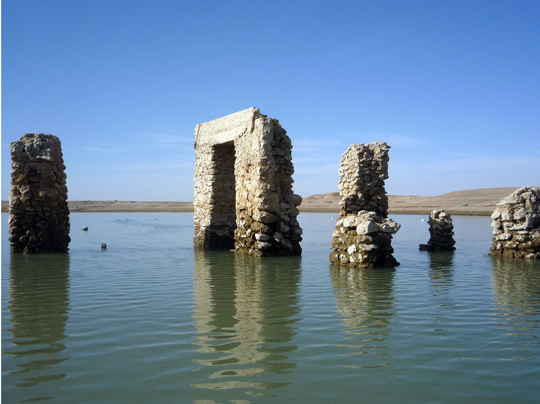

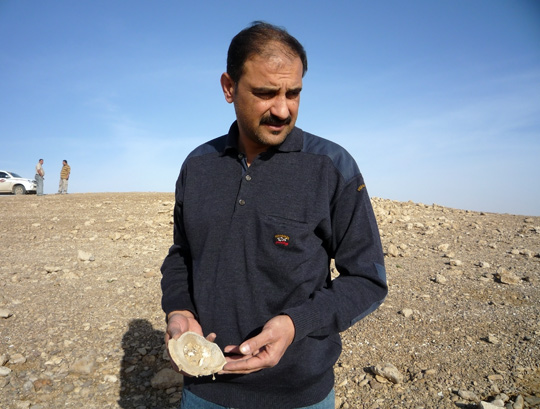 تتوالى في هذا الشهر تقارير القنوات الفضائية عن انحسار الفرات
تتوالى في هذا الشهر تقارير القنوات الفضائية عن انحسار الفرات
من البي بي سي الى العربية الى الجزيرةقناة الجزيرة من الخبر هذا اليكم 
